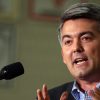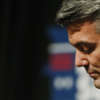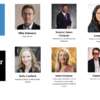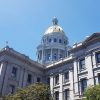Every now and then, I read a book which hits me with such a profound impact that, like Paul on the road to Damascus, I find my life divided into before and after, incapable of recovering from the revelation. More than a decade ago, legendary investigative journalist Katherine Stewart’s first book, The Good News Club: The Christian Right’s Stealth Assault on America’s Children, hit me with just such a haymaker. The Good News Club was not only revelatory, it was inspiring: ten years after I read it, the book was constantly on my mind as I investigated the happenings in the Woodland Park school district two years ago.
It’s rare for any book to have that kind of impact, but not surprising that Stewart was able to achieve it. She has a preternatural ability for staying one step ahead. In 2020, she released The Power Worshippers: Inside the Dangerous Rise of Religious Nationalism, immediately before sentiments associated with Christian nationalism started skyrocketing in national polls following Trump’s defeat that year.
Now, she has done it again. Next week, less than a month after Donald Trump’s return to office, Stewart will be publishing Money, Lies, and God: Inside the Movement to Destroy American Democracy. In the book, which I read over the holidays, Stewart takes aim at the intertwined religious and political movements striving to compromise American democracy to a permanent end. In the process, as the publishers’ blurb puts it, Stewart introduces readers to “reactionary Catholic activists, atheist billionaires, pseudo-Platonist intellectuals, self-appointed apostles of Jesus, disciples of Ayn Rand, women-hating opponents of ‘the gynocracy,’ pronatalists preoccupied with the dearth of white babies, Covid truthers, militia members masquerading as ‘concerned moms’ and battalions of spirit warriors who appear to be inventing a new style of religion even as they set about attacking democracy at its foundations.”
Stewart’s uncommonly clear-eyed understanding of the times and her talent for efficient and propulsive delivery of information make Money, Lies, and God one of the most helpful and informative books to ever chronicle the modern movements against American democracy. The timing of the book’s release, and its focus on how those movements operate, make it one of the most important.
I had the fortune to speak with Katherine Stewart about her new book last month. Our conversation is below.
You have been chipping away at important issues at the intersection of democracy and religion for a long time now, with both The Good News Club and The Power Worshippers. I know it’s a big question, but what first attracted your interest to these issues, and what about that intersection do you see as so important?
I first got interested in these issues when a fundamentalist Bible club installed itself at my six-year-old daughter’s public elementary school in Santa Barbara, California. The Club tells very young children that anyone who fails to conform to their particular variety of the Christian faith will go to hell, and it instructs them to attend the “right kind” of church. It confuses very young children into thinking that their public school endorses their form of religion, and it gives kids points or prizes or even candy for recruiting their peers. Public schools have a kind of cloak of authority in the minds of young children especially; if it’s happening in their school, they think it’s what their school, as an instrument of government, wants them to believe.
So my introduction to the movement started with the sense that some people seemed to feel entitled to tell families that are “different” that they don’t belong. They also seemed to have no problem engaging in manipulation and deceit – of small children, of public elementary school systems, of whatever gets in their way. They were part of a movement that claimed to respect the “American family” but treated families that didn’t look like theirs with contempt. I was shocked to discover the hostility to public education that lay just beneath the surface of their operations. I also had the feeling that we were losing some of the civility and mutual respect that we need for a functioning democracy in a diverse and pluralistic society. People sometimes asked me if I was worried about my kids. I wasn’t; I was worried about our country.
Both of your previous books, The Good News Club and The Power Worshippers, effectively presaged what we are currently seeing in Woodland Park, Colorado, where a ministry has declared its intention to “take over” the town, and has taken steps towards doing so, first by taking over the school board. Are you aware of any other ongoing examples of this kind of local takeover strategy?
Yes, I hear from readers about parallel or similar episodes taking place in towns in Pennsylvania, Tennessee, California, and other places. We have to understand that this drive for control is a big part of Christian nationalism. Many of the activists within this movement believe that they have a hold on the absolute truth, and that it is their right and duty to take over and dominate all aspects of life, starting with government and including local government.
Your upcoming book – Money, Lies, and God, which is due out in February – is an astonishing work of research and synthesis, and easily the most comprehensive explanation I have ever read of how the authoritarian right builds and deploys strength. In reading about the ways this right-wing movement has funded and propagated itself, often through friendly or custom-made media sources, backed by neverending flows of cash from private family foundations, I was struck by a familiar feeling: that they’re outrunning us. Do you believe that the movement pushing for American authoritarianism is better-organized than the forces standing for democracy? And, if so, what should we be doing right now to start fixing that imbalance?
The right is definitely better organized. It is not bigger, but it is more integrated, more disciplined, and more ruthless than anything on the side of democracy. So yes, if we want to save democracy, we are going to have to organize back.
We need to skip some of the purity tests and make sure we have a tent big enough to fit the majority of people who want to preserve democracy. We have to think about how you help people build careers in progressive politics and not just win one-off policy skirmishes. We need to work at the local level as well as on national messaging, and that means getting involved in schools, in houses of worship (in ways that do not alienate those who are not particularly religious), and other community-based activities.
In Money, Lies, and God, you write a lot about the funding apparatuses propping-up the right-wing and Christian nationalist movements, discussing several of the same mega-funders I have written about in the past: Kochs, DeVoses, Bradley and Scaife and other private foundations – groups which Judge Richard Posner once described as being subject to fewer political controls than hereditary monarchies. In your view, what can be done to regulate the vast flows of money eroding the foundations of our democratic institutions? Or is American democracy destined to drown in cash like some bad metaphor?
That’s a great metaphor! But there are potential laws and policies that could be used to diminish the overwhelming power of money in our political system. We have the power to pass laws that would overturn the horrific Citizens United ruling from the Supreme Court, which ruled that corporations, including for-profit and non-profit organizations, can fund political campaigns, even while allowing them to hide their involvement.
We don’t need to tolerate this level of dark money in our political system. We could go further and create public funding for political campaigns. There’s also a lot that we can do through the regulation of internet and media to diminish the power and reach of misinformation. So yes, it’s true that beyond a certain point the concentration of wealth will overwhelm us and drown us, as you say. But we’re not there yet. We can fight the tide!

Operationally, the right-wing has an advantage: a donor class willing to fund the movement more or less permanently, all for the sake of tax cuts which will benefit them most of all. As you put it in the book: “The reigning theory is that donors will put up with the raw eggs, the Bronze Age nuttery, the Sonnenrad, the end of democracy, and all that, as long as it delivers lower taxes and a government small enough to be unable to defend the public, but big enough to defend their own private interests.” Yet, you point out, history shows that backing authoritarians does not usually work out for the donor class in the end. Do you see the right-wing’s mega-funders as being threatened by the very thing they paid to create?
Yes, as they destroy democracy for the rest of us, they are also, in a sense, in the process of destroying themselves; they just don’t know it. But one qualification I’d make to the way you framed it is that I don’t see them as rational actors merely in pursuit of a few extra pennies on their bottom line. They are motivated by tax cuts (along with government subsidies and privileged contracts – so much for the “free market”), but they are also motivated by fear. They fear the loss of their privilege. Some of them fear social chaos and the idea that the little people who are being exploited will come after them with pitchforks, metaphorically speaking. Above all, they fear the little people all around them. And that’s the irrationality that leads them to overstep, and to invest their unearned wealth in authoritarian projects that are intended to calm their fears but in reality, exacerbate the danger they face.
In the new book, you write about the role media and social media play in the authoritarian-right’s movement-building – “an information bubble within which supporters may be maintained in a state of fact-denial,” you called it. But that information bubble impacts the media outside of it. Do you believe that right-wing media has caused a right-wing tilt in the mainstream media?
Yes, absolutely. The classic case is still the “Hillary Clinton emails something something.” Here you had a “scandal” that was pumped up entirely within the right-wing bubble, and then the mainstream media saw fit to lavish immense coverage on it because it was somehow an “issue.” The result was that even without necessarily intending it, the main-stream media was pushing the debate very much to the right. But there are countless other examples of the same phenomena playing out today.
The alternative media ecosystem established by the right and religious-right has been immensely successful, sparking periodic calls for the left-wing to catch up and establish its own media ecosystem. With so much of the right-wing media ecosystem relying on fear and falsehood, though, is it even possible to replicate something like that on the pro-democracy side of the aisle? And, if not, what do you see as the best way to start counteracting the impact of the right-wing mediasphere?
I want to start by saying that I don’t think it’s right to imagine that there is a symmetry between “right” and “left” here. Because “right” here refers to authoritarianism, and “left” here is referring to democracy. Disinformation at some level always serves unjust authority, and information at some level –a fundamental level to be sure — always serves democracy. So the big answer here is not to come up with an equal and opposite source of misinformation on the side of democracy, but to continue to find ways to undermine the power of misinformation systems.
All media makes use of publicly supported and subsidized channels. So in my mind, things like a version of the Fairness Doctrine and net neutrality need to be restored. We need to use the policy levers we have to stop the massive production of willful and malicious misinformation.
Colorado is home to at least one Christian nationalist media organization which has grown a national audience over the last few years, Truth & Liberty, affiliated with Andrew Wommack’s Woodland Park-based ministry. Being one of the only people regularly covering those organizations, I was thrilled to see you mention both Wommack and Truth & Liberty in your new book. Can you tell us how those organizations ended up on your radar? Do you see them as relevant to the movement you document in the new book?
One of the most useful methods I follow is simply to listen to what the people I am reporting on are listening to, watch what they watch, and note their own media appearances. Most people outside the Christian nationalist or right-wing bubble have no idea what kind of programming the people on the inside are getting, and this is especially true with regard to religious media. People who are not part of that conservative Christian community never watch it and have little sense of how it behaves. That’s how I came across Truth & Liberty.
There’s another method I follow, tried and true, which is follow the money. Many of these authoritarian media operations are densely interconnected. They rely on a common group of funders and activists and organizers. And that’s definitely the case with Wommack and Truth & Liberty. I first came across their operations when I was looking into another key movement activist, Bill Dallas, an early guest on their show. Dallas was critical in the development of Project Blitz and United in Purpose, both of which I covered at length in articles I wrote in 2018 for The New York Times, as well as in my previous book, The Power Worshippers.
David Barton, a co-founder of Truth & Liberty and the Christian nationalist movement’s favorite pseudohistorian, makes frequent appearances in your new book. Can you tell us about the role that Barton’s fabricated version of American history plays in the movement?
Barton could almost be described as the founding ideologue of the current iteration of Christian nationalism. He’s been at this for some four decades. To many outsiders and academic historians, his work mostly reads like pure schlock – a mashup of decontextualized quotations leading to blatant falsification of American history. But he says exactly what the insiders of the movement want to hear, and in the way they want to hear it. He basically tells them that they are the original and authentic Americans by virtue of their faith, everyone else is here by their grace only, and that they therefore have the right to rule and control the rest of society.
It’s important to understand, too, that Barton isn’t just a producer of books and pamphlets. He, along with his son Tim, is very much an activist who organizes prayer gatherings for politicians who are part of the authoritarian movement; campaigns actively and aggressively for candidates; funnels money to allied groups; trains other activists, including young activists; and participates in strategy formation with other activists and leaders. It’s also important to recognize that Barton is running a pretty big business, with lots of promotional material and fundraising capabilities.
The prevalence of conspiracy theories among right-wing evangelicals – something I have been fascinated by since seeing so many of the evangelical peers of my upbringing fall down the QAnon rabbit hole – really leaps off the page in Money, Lies, and God. Do you think something about that population makes them particularly susceptible to conspiracism? What role do you see conspiracism as playing in the broader movement?
Sadly, conspiracism is a central theme of the movement and the book. In my mind there are some important systemic causes for the rise of conspiracism. People turn to it when they feel disempowered and lose their trust in social institutions. Rising inequality makes people disempowered, and the wholesale assault on truth and on democratic government in the right-wing media further destroys their trust. So they turn to irrational conspiracy theories as a way of regaining some sense of control in a world that they see as thoroughly hostile.
It’s important to add that many authoritarian actors don’t simply exploit this tendency toward conspiracism but actively work to exacerbate it. The ReAwaken America tours that I describe in one chapter of the book are often viewed as traveling freak shows for the amusement of a low-information population. But in fact they are part of a consciously designed and genuinely malevolent program to promote fear, anger, and distrust among a large subset of our population, sentiments that are then deliberately mobilized for authoritarian political purposes.
You also talk about the blurry line between QAnon-style conspiracy theorizing, and very real sentiments around spiritual warfare and demonic possession. When I was growing up in the church, talk of spiritual warfare was largely metaphysical – something happening on the spiritual plane which we couldn’t impact even if we wanted to. Now, it seems that a lot of discussion of spiritual warfare has become much more physical and literal. Do you have a sense of how common it is for members of the movement you write about to view their political opponents as literally demonic?
The forms of religion that embrace the idea that “spiritual warfare” is playing out in the political realm here and now are the fastest growing parts of American religion. This phenomenon doesn’t receive as much attention as it should. A lot of the coverage still uses very general terms like “conservative Christian” or “evangelical,” as if to suggest the people who fit that label now have the same beliefs and practices as those who did 20 or 40 years ago. In fact, many congregations and denominations have drawn huge new followings by promoting the idea that spiritual warfare is very real, it is happening right now, and you can see it on your screens and in the headlines.
A key measure of this phenomena is that leading politicians on the Right are now explicitly appealing to the same views and in the same language. It’s hard to imagine Republicans of not so long ago, people like Romney or Reagan, stooping to describe their political opposition in ways that DeSantis and Trump and his political allies do, suggesting that “RINOs” and Democrats are literally working with the devil.
What would you tell someone who is skeptical that religious nationalism can actually threaten – and is actually threatening – our democratic institutions?
It’s part of the “it can’t happen here” mentality. This is what people have told themselves in other parts of the world, and at various points in history, when autocratic forces were on the rise. After having watched a coup attempt on my television, along with Trump’s threat to stage another one should he have lost the 2024 election, I find it hard to understand why people continue to think it can’t happen here.
I would tell them to set aside their assumptions about religion and politics and familiarize themselves with the facts. A good place to start is my books and the work of others in this field.
As a hope junkie, my favorite part of the new book was the conclusion, in which you provided six takeaways. While all six were great (including “we are in the majority” and “they are divided”), it was the last one which really hung with me: “Organization matters.” Can you tell us a little bit more about what you mean by that, and what people who hope to defend democracy can do to turn those hopes into meaningful actions?
It’s pretty hard to say something practically useful in a short space because organizing is, after all, about the details. Even so, I have some some general points that I want to make about the need for organization among supporters of democracy.
First, we tend to overemphasize national discourse and underemphasize local action. Getting involved in local action has been critical for the authoritarian movement, and people on the side of democracy should learn from that.
Second, we tend to overemphasize policy wins and underemphasize people. The right has been very successful in creating an ecosystem within which individuals can build careers and contribute to the movement over a lifetime. Progressive activists are often left to fight individual battles one at a time with insufficient support.
And a third general point is that we need to be more oriented toward the long term. It’s astonishing in retrospect that the authoritarian movement began laying groundwork for its current successes forty or fifty years ago, with the creation of ideological groups like the Federalist Society and various think tanks. Democratically aligned people need to think as well in terms of institution-building over the long haul, of putting in place, brick by brick, the kinds of media and research, educational and political assistance that will deliver power to an enlightened people and sustain our democracy and its institutions.
Money, Lies, and God: Inside the Movement to Destroy American Democracy, by Katherine Stewart, is out on February 18, 2025. You can pre-order it here.




